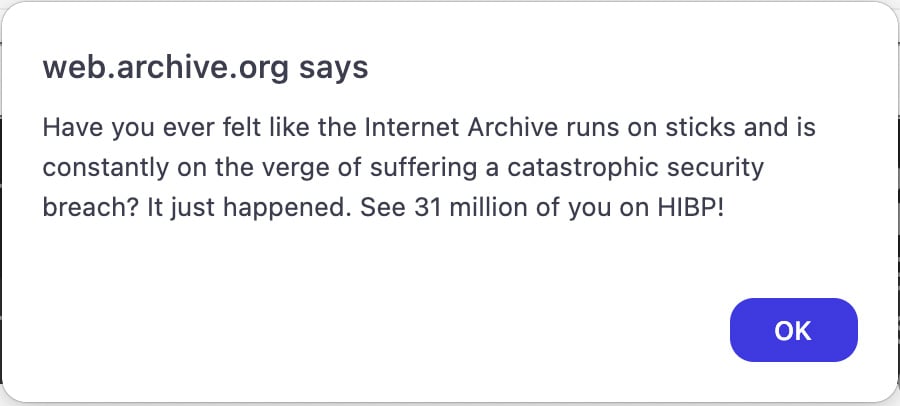Internet Archive’s “The Wayback Machine” has suffered a data breach after a threat actor compromised the website and stole a user authentication database containing 31 million unique records.
News of the breach began circulating Wednesday afternoon after visitors to archive.org began seeing a JavaScript alert created by the hacker, stating that the Internet Archive was breached.
“Have you ever felt like the Internet Archive runs on sticks and is constantly on the verge of suffering a catastrophic security breach? It just happened. See 31 million of you on HIBP!,” reads a JavaScript alert shown on the compromised archive.org site.

Source: BleepingComputer
The text “HIBP” refers to is the Have I Been Pwned data breach notification service created by Troy Hunt, with whom threat actors commonly share stolen data to be added to the service.
Hunt told BleepingComputer that the threat actor shared the Internet Archive’s authentication database nine days ago and it is a 6.4GB SQL file named “ia_users.sql.” The database contains authentication information for registered members, including their email addresses, screen names, password change timestamps, Bcrypt-hashed passwords, and other internal data.
The most recent timestamp on the stolen records is September 28th, 2024, likely when the database was stolen.
[…]
Update 10/10/24: Internet Archive founder Brewster Kahle shared an update on X last night, confirming the data breach and stating that the threat actor used a JavaScript library to show the alerts to visitors.
“What we know: DDOS attacked-fended off for now; defacement of our website via JS library; breach of usernames/email/salted-encrypted passwords,” reads a first status update tweeted last night.
“What we’ve done: Disabled the JS library, scrubbing systems, upgrading security.”
A second update shared this morning states that DDoS attacks have resumed, taking archive.org and openlibrary.org offline again.
Source: Internet Archive hacked, data breach impacts 31 million users
Who the fuck hacks the internet archive?!



